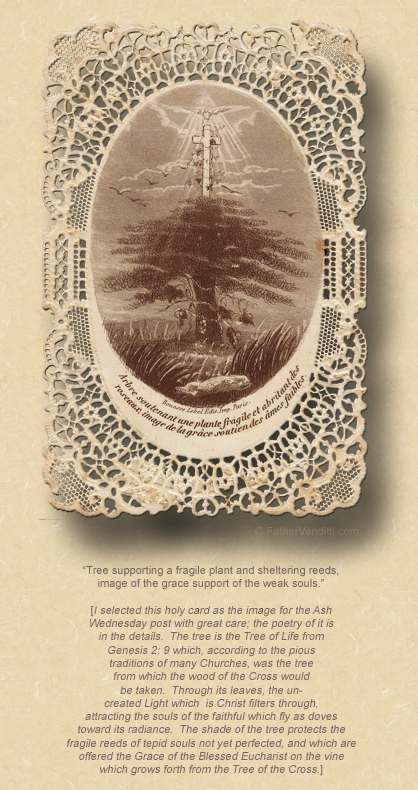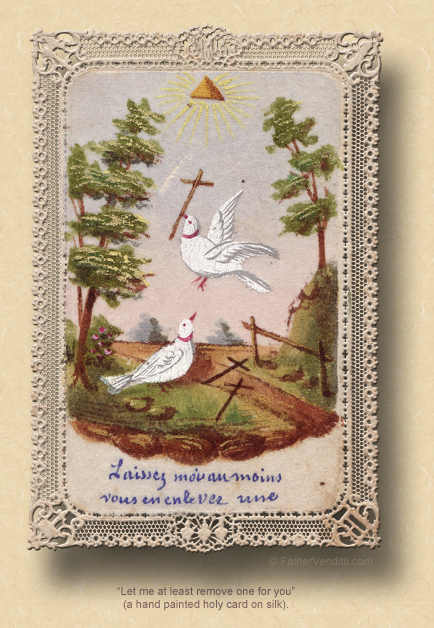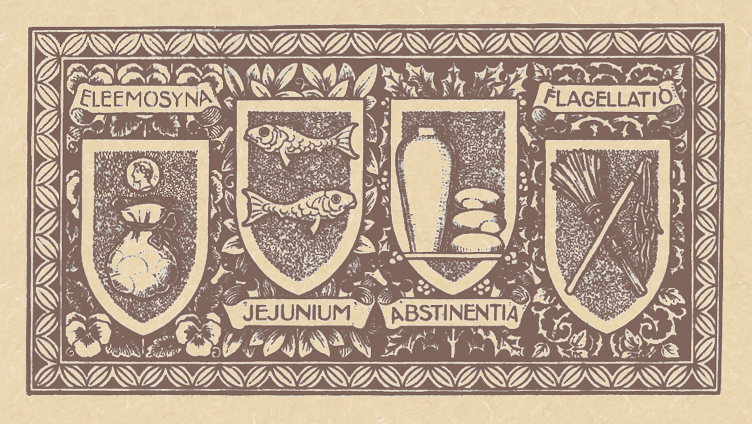The True Measure of Our Penance.
The First Day of Lent, known as Ash Wednesday.
Lessons from the feria, according to the ordinary form of the Roman Rite:
• Joel 2: 12-18.
• Psalm 51: 3-6, 12-14, 17.
• II Corinthians 5: 20—6: 2.
• Matthew 6: 1-6, 16-18.
Lessons from the feria, according to the extraordinary form of the Roman Rite:
• Joel 2: 12-19.
• [Gradual] Psalm 56: 2, 4.
• [Tract] Psalm 102: 10.
• Matthew 6: 16-21.
FatherVenditti.com
|
 10:56 AM 2/26/2020 — If you’re old enough—or even if you’re young and like to attend the Traditional Latin Mass from time to time—you’d be familiar with something called the Septuagesima Season:—the Byzantines call it the Triodion—a pre-Lenten season in which we ease ourselves into a spirit of self-denial. In the Eastern Churches, in which I served for many years, the last two weeks of this pre-Lent have peculiar sounding names: Meatfare being the last week during which they eat meat, and Cheesefare being the last week they eat dairy products, abstaining completely from both throughout the whole of Lent. They call the faithful of those Churches to focus on very concrete things for a reason. Jesus didn’t just sit down and think about what it would be like to fast for forty days in the desert, and then contemplate how that might change him; he actually went there and actually fasted. And while we might be thankful that we are not Eastern Christians and don't have to do that kind of fasting, the relevancy of that example should not be dismissed out of hand. If my Lent consists of: “I’ll give up desserts; I’ll cut an hour of my Facebook time; I’ll say an extra ten minutes of prayers each night…”; that’s wonderful; but it’s not Lent, because it’s all just symbolic. A symbol—whether it be a picture or a word or a symbolic act—no matter how meaningful it may be, is still just a ghost. If it has no substance, it cannot change me concretely. But if my Lent is not just a symbol—if it is something which I allow to completely reorient my life, turning me away from the things of this world toward the things of God to the extent that my state if life permits—then, over the course of a lifetime of Lents, it can make the difference between heaven and hell. And that—at the risk of sounding amusingly tempered—is not insignificant. 10:56 AM 2/26/2020 — If you’re old enough—or even if you’re young and like to attend the Traditional Latin Mass from time to time—you’d be familiar with something called the Septuagesima Season:—the Byzantines call it the Triodion—a pre-Lenten season in which we ease ourselves into a spirit of self-denial. In the Eastern Churches, in which I served for many years, the last two weeks of this pre-Lent have peculiar sounding names: Meatfare being the last week during which they eat meat, and Cheesefare being the last week they eat dairy products, abstaining completely from both throughout the whole of Lent. They call the faithful of those Churches to focus on very concrete things for a reason. Jesus didn’t just sit down and think about what it would be like to fast for forty days in the desert, and then contemplate how that might change him; he actually went there and actually fasted. And while we might be thankful that we are not Eastern Christians and don't have to do that kind of fasting, the relevancy of that example should not be dismissed out of hand. If my Lent consists of: “I’ll give up desserts; I’ll cut an hour of my Facebook time; I’ll say an extra ten minutes of prayers each night…”; that’s wonderful; but it’s not Lent, because it’s all just symbolic. A symbol—whether it be a picture or a word or a symbolic act—no matter how meaningful it may be, is still just a ghost. If it has no substance, it cannot change me concretely. But if my Lent is not just a symbol—if it is something which I allow to completely reorient my life, turning me away from the things of this world toward the things of God to the extent that my state if life permits—then, over the course of a lifetime of Lents, it can make the difference between heaven and hell. And that—at the risk of sounding amusingly tempered—is not insignificant.
Which brings us to the Gospel lesson for this day, which, on the surface, seems little more than some pragmatic admonitions by our Lord about the sincerity of our penitential acts: don't make a show in giving alms, don't make a spectacle of yourself when you pray, don't alter your appearance so everyone can see your mortification; nothing that we all don't know instinctively. During the season of Lent, we're going to be getting a lot of Scripture lessons at Holy Mass that pertain to mortification, fasting, prayer and sincerity in our actions; and, when we hear them, the temptation will always be to apply them to everyone but ourselves: we'll be sitting in the pew and hear our Lord say something, and the first thing that pops into our head is, “Gee, I hope So-and-so heard that”; we often don't bother to ask whether we heard it ourselves.  It reminds me of something I learned very early on when I was first discerning my vocation, and had experimented with the monastic life among the Carthusians, a community of hermits founded by Saint Bruno. In his monastic rule, written in the year 1050, he makes a statement that I believe can be adapted as a suitable item for anyone's examination of conscience, particularly during Lent: he says that, whenever you see a brother doing anything that is forbidden,—whether it's conversing with a woman, or entering a shop, or eating meat, or anything at all the monks do not do—instead of running to the prior to “rat him out,” just assume he has permission; your job is to purify your own soul, not to police someone else's. It reminds me of something I learned very early on when I was first discerning my vocation, and had experimented with the monastic life among the Carthusians, a community of hermits founded by Saint Bruno. In his monastic rule, written in the year 1050, he makes a statement that I believe can be adapted as a suitable item for anyone's examination of conscience, particularly during Lent: he says that, whenever you see a brother doing anything that is forbidden,—whether it's conversing with a woman, or entering a shop, or eating meat, or anything at all the monks do not do—instead of running to the prior to “rat him out,” just assume he has permission; your job is to purify your own soul, not to police someone else's.
So, today we bless ashes made from the burning of the palms from last year's Palm Sunday; and, in a tradition that goes back a thousand years, we are marked with those ashes as a symbol of our desire to do penance and purify our lives. But, like all symbols, it has the potential to be meaningless if we receive it in a superstitious way, or if it's just there for others to see. Personally, I wash mine off after Mass, especially after what our Lord says in today's Gospel lesson about washing your face and not altering your appearance. I like the new translation, in which our Lord says, “anoint your head and wash your face”; the old translation said, “wash your face and comb your hair,” which didn't mean a whole lot to me. I'm not telling you that you should wash off your ashes; that's just what I do. But whether you wash them off or leave them there, don't forget that the mark on your head does no good if it is not accompanied by a mark on your soul; and, the best way to determine that is how you treat and judge others.

|

